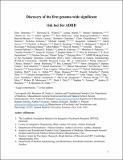Files in this item
Discovery of the first genome-wide significant risk loci for attention deficit/hyperactivity disorder
Item metadata
| dc.contributor.author | ADHD Working Group of the Psychiatric Genomics Consortium (PGC) | |
| dc.contributor.author | Early Lifecourse & Genetic Epidemiology (EAGLE) Consortium | |
| dc.contributor.author | 23andMe Research Team | |
| dc.contributor.author | Kent, Lindsey | |
| dc.date.accessioned | 2020-10-27T16:56:41Z | |
| dc.date.available | 2020-10-27T16:56:41Z | |
| dc.date.issued | 2019-01 | |
| dc.identifier | 270391608 | |
| dc.identifier | 59ecb314-b4e4-451b-b114-41cbe0f61ec3 | |
| dc.identifier | 30478444 | |
| dc.identifier | 85057436335 | |
| dc.identifier | 000454108800014 | |
| dc.identifier.citation | ADHD Working Group of the Psychiatric Genomics Consortium (PGC) , Early Lifecourse & Genetic Epidemiology (EAGLE) Consortium , 23andMe Research Team & Kent , L 2019 , ' Discovery of the first genome-wide significant risk loci for attention deficit/hyperactivity disorder ' , Nature Genetics , vol. 51 , no. 1 , pp. 63-75 . https://doi.org/10.1038/s41588-018-0269-7 | en |
| dc.identifier.issn | 1061-4036 | |
| dc.identifier.other | PubMedCentral: PMC6481311 | |
| dc.identifier.other | ORCID: /0000-0002-5315-3399/work/81405655 | |
| dc.identifier.uri | https://hdl.handle.net/10023/20827 | |
| dc.description.abstract | Attention deficit/hyperactivity disorder (ADHD) is a highly heritable childhood behavioral disorder affecting 5% of children and 2.5% of adults. Common genetic variants contribute substantially to ADHD susceptibility, but no variants have been robustly associated with ADHD. We report a genome-wide association meta-analysis of 20,183 individuals diagnosed with ADHD and 35,191 controls that identifies variants surpassing genome-wide significance in 12 independent loci, finding important new information about the underlying biology of ADHD. Associations are enriched in evolutionarily constrained genomic regions and loss-of-function intolerant genes and around brain-expressed regulatory marks. Analyses of three replication studies: a cohort of individuals diagnosed with ADHD, a self-reported ADHD sample and a meta-analysis of quantitative measures of ADHD symptoms in the population, support these findings while highlighting study-specific differences on genetic overlap with educational attainment. Strong concordance with GWAS of quantitative population measures of ADHD symptoms supports that clinical diagnosis of ADHD is an extreme expression of continuous heritable traits. | |
| dc.format.extent | 13 | |
| dc.format.extent | 1070592 | |
| dc.language.iso | eng | |
| dc.relation.ispartof | Nature Genetics | en |
| dc.subject | Adolescent | en |
| dc.subject | Attention Deficit Disorder with Hyperactivity/genetics | en |
| dc.subject | Brain/physiology | en |
| dc.subject | Child | en |
| dc.subject | Child, Preschool | en |
| dc.subject | Cohort Studies | en |
| dc.subject | Female | en |
| dc.subject | Gene Expression Regulation/genetics | en |
| dc.subject | Genetic Loci/genetics | en |
| dc.subject | Genetic Predisposition to Disease/genetics | en |
| dc.subject | Genome-Wide Association Study/methods | en |
| dc.subject | Humans | en |
| dc.subject | Male | en |
| dc.subject | Polymorphism, Single Nucleotide/genetics | en |
| dc.subject | Risk | en |
| dc.subject | QH426 Genetics | en |
| dc.subject | RC0321 Neuroscience. Biological psychiatry. Neuropsychiatry | en |
| dc.subject | 3rd-DAS | en |
| dc.subject.lcc | QH426 | en |
| dc.subject.lcc | RC0321 | en |
| dc.title | Discovery of the first genome-wide significant risk loci for attention deficit/hyperactivity disorder | en |
| dc.type | Journal article | en |
| dc.contributor.institution | University of St Andrews. Cellular Medicine Division | en |
| dc.contributor.institution | University of St Andrews. Institute of Behavioural and Neural Sciences | en |
| dc.contributor.institution | University of St Andrews. School of Medicine | en |
| dc.identifier.doi | https://doi.org/10.1038/s41588-018-0269-7 | |
| dc.description.status | Peer reviewed | en |
| dc.date.embargoedUntil | 2019-05-26 | |
| dc.identifier.url | http://orca.cf.ac.uk/id/eprint/110923 | en |
This item appears in the following Collection(s)
Items in the St Andrews Research Repository are protected by copyright, with all rights reserved, unless otherwise indicated.

